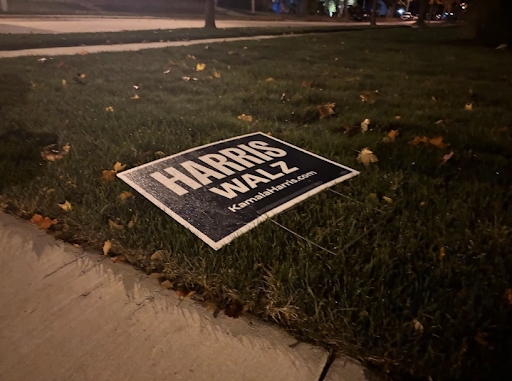Harris Lost The Election. This Is Why.

A look into the results of the 2024 election
At 5:34 AM CST on November 6, Wisconsin was called in favor of Trump, pushing him past the 270 electoral vote threshold and solidifying him as the 47th president of the United States. Many supporters of Harris have been surprised and disappointed by these results. So what happened?
There were undoubtedly a variety of factors that contributed to Trump’s landslide win, but all of it ultimately comes down to one thing: an astonishingly low voter turnout amongst democratic voters.
Trump won the popular vote in 2024 by roughly 3 million votes as of November 13, winning in every single battleground state, and yet his vote count stagnated compared to 2020. Harris on the other hand received roughly 10 million votes less than Biden did in 2020. So in such an important election, what led to such a highly decreased population of Democratic voters?
The Working Class
Many voting blocks considered to be democratic strongholds saw a significant shift to the right this election. For example, amongst non-white voters as a whole, Harris lost 7 points to Biden in 2020. Perhaps the most drastic shift is seen in the Latino population. Harris lost a significant 16 points this election amongst Latino men, and a not insignificant percentage of Latino women; 9 percent to be exact.
This major shift in Latino voters is indicative of a much larger voting block, one that is cited by many as a crucial population that the Democratic party has left behind. See, the Latino population makes up a disproportionate population of the working class, comprising the vast majority of new workers in the labor force between the years of 2010 and 2020, and the same is projected from the years of 2020 to 2030, with a percentage of roughly 78% projected by the U.S Department of Labor.
This is a population of voters that retrospectively, many Democratic allies feel were left behind by Biden and Harris’ respective campaigns. “We did not have a compelling enough economic vision,” says Democratic representative Ro Khanna for CBS. He goes on to suggest that the Democratic economic agenda, while stronger than that of the Republicans, didn’t see enough focus in what truly could have been a winnable campaign had more attention been given to the issue.
Furthermore, many voters perceive the economy to be worse now than it was four years ago. The economy was the most important issue of the American voters this election, with 32% listing it as their top issue. Of this 32%, 80% voted red. The vast majority of people who feel more financially unstable now than they did 4 years ago also voted, in the vast majority, red.
The incumbent party losing with the economy being a prominent issue is not a phenomenon unusual to the United States. In fact, incumbents all across the world lost, with inflation on the rise across the world. As such, it could be said that as the incumbents, the Democrats were doomed in this election from the start. However, Harris’ failure to differentiate herself from Biden and provide a strong economic agenda did not improve her standing with working class voters.
An Allegiance To Conservative Policy
The Harris campaign ran on a great deal of right wing issues, and this is no secret: increased border security, military spending, conservative climate policy and support for the state of Israel. But how did this affect her campaign?
Judging by the increased popularity of left-wing ideas, it’s safe to say this hurt her. Saul Levin, political director of the Green New Deal Network, criticized her stance on fracking, saying the network “disagreed from a moral and scientific standpoint, but also from a strategic standpoint”.
Progressive climate policies are overwhelmingly popular, and the majority of progressive voters cite the environment as a major issue for them. As such, Harris’ stance on the issue and her failure to differentiate herself in a strong way from her opponent likely failed to inspire a population of climate-oriented voters to cast their ballot blue.
The Democratic stance on the climate this election is only one example of progressive policies proving to be popular. Missouri, a traditionally red battleground state, voted to repeal a state abortion ban in a historic decision this election. Progressive policies are on the rise - and the Democratic party failed to capitalize off of that.
Furthermore, Harris’ controversial stance on Gaza during this election did not resonate with voters. The most glaring example of this negatively affecting her campaign can be seen in the city of Dearborn, the largest majority-Arab city in the country. Despite Trump’s unapologetic pro-Israel stance, he ultimately won the city with 42% of the popular vote. This is due to a significantly large turnout for Jill Stein, the candidate for the Green Party, winning roughly 18% of the vote herself.
Democrats this election cycle have been quick to vindicate third party voters, a voting population that was ultimately inconsequential - except in the state of Michigan. Due to Stein’s popularity in the city of Dearborn, Democrats lost by a significantly larger percentage than they otherwise would have had all progressive third party votes been given to the Democrats, putting her well within the 1% deficit range, giving significant grounds for a recount.
While third party, Arab, and Latino voters can not be blamed for the results of the election, they ultimately indicate one thing - the Democratic party failed the people who need their political support the most, and due to their failure to garner the support they needed from these groups, the election could never have swung in Harris’ favor.